|
|
|
Sort Order |
|
|
|
Items / Page
|
|
|
|
|
|
|
| Srl | Item |
| 1 |
ID:
095018
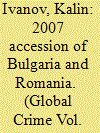

|
|
|
|
|
| Publication |
2010.
|
| Summary/Abstract |
For both objective and subjective reasons, the European Union devoted unprecedented attention to the problem of corruption in Bulgaria and Romania. The European Union (EU) faced a complex challenge in wielding its arsenal of carrots and sticks to encourage reform in the two countries. Conditionality was further complicated by rivalries between Sofia and Bucharest. Despite its limits, EU pressure presented a rare opportunity to depoliticise anti-corruption policy. After accession, Romania regressed from its previous achievements against corruption, and Bulgaria remained reluctant to prosecute senior officials or confront organised crime. Nevertheless, the European Commission continued its monitoring activities, and its ability to freeze funds maintained a modicum of pressure for reform. More effective anti-corruption efforts are possible if a domestic constituency for reform gains sufficient momentum to replace the EU's waning influence.
|
|
|
|
|
|
|
|
|
|
|
|
|
|
|
|
| 2 |
ID:
172040


|
|
|
|
|
| Summary/Abstract |
In 2005, Cabo Verde became the second African country to receive the new foreign aid programme of the USA, the Millennium Challenge Account (MCA). It was among the few recipients of a second grant. Foreign aid has always been a controversial and hotly contested issue, and the MCA is no exception. This paper, based partly on personal experience with the programme, provides a critical examination of the nature, process and implementation of the MCA grants in Cabo Verde. The country had campaigned aggressively for the grants. The MCA not only financed important public investments, it was debt-free and without conditionalities. However, even while it allowed more leeway over its use and implementation compared with other aid programmes, it engendered its own challenges.
|
|
|
|
|
|
|
|
|
|
|
|
|
|
|
|
| 3 |
ID:
111551
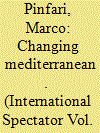

|
|
|
|
|
| Publication |
2012.
|
| Summary/Abstract |
This article discusses the role played by the European Union, African Union and Arab League in the recent revolutions in Tunisia, Egypt and Libya. It focuses in particular on the use and impact of political and economic conditionality, the decision-making processes within each organisation and the inter-regional forums created to deal with the crisis. The analysis acknowledges the increasingly active and vocal role played by regional organisations in the so-called 'Arab spring', but it highlights not just that they had few legal powers to intervene in these crises, but also that they seemed very reluctant to use any form of political or economic conditionality. It also reveals that the main purpose of inter-regional forums was arguably not to generate consensus internationally but rather to manage dissent. As such, the article encourages a reflection on the specific challenges and opportunities that North Africa and the Mediterranean region pose to regional conflict management.
|
|
|
|
|
|
|
|
|
|
|
|
|
|
|
|
| 4 |
ID:
138120


|
|
|
|
|
| Summary/Abstract |
This paper argues that policy space ownership dynamics, political and historical institutional variables determine the implementation of reforms advocated within the context of the international transfer of public sector reform models to Africa. Through the case of the Malawi Hospital Autonomy reforms, this paper demonstrates that although policies transferred by international donor organisations to African countries through aid conditionality may be initially adopted so as to secure the much-needed developmental aid, the actual implementation of such reforms is not an automatic process. This is due to contextual factors, which in part include the neo-colonial struggle for policy ownership in the face of conditionality, path dependency tendencies and veto players that are constrained by deeply entrenched political and historical institutional proclivity that lead to policy stability even in the context of coercive policy transfer pressures. Taking a qualitative approach, the analysis combines the use of primary and secondary data. The study findings show that while other African countries successfully implemented such reforms, Malawi has not, due to specific implementation, historical, political and institutional factors.
|
|
|
|
|
|
|
|
|
|
|
|
|
|
|
|
| 5 |
ID:
144469
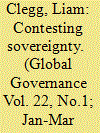

|
|
|
|
|
| Summary/Abstract |
There is a battle over military expenditure at the International Monetary Fund, with consistent pressure from its most powerful member for the Fund to get tough on military expenditure being pitted against lowerorder states' invocation of the organization's sovereignty-protecting rules and practices. While the formal victory of the lower-order states has been codified in the Fund's relatively weak Guidelines on Military Expenditure, on a case-by-case basis policy shifts continue to be imposed on borrowers through the application of informal influence by the US Executive Director in the IMF boardroom. By integrating insights from literature exploring the tension between formal rules and informal practices in international organizations, this case study extends the understanding offered in the international relations literature of the foundations of sovereign inequality in international politics.
|
|
|
|
|
|
|
|
|
|
|
|
|
|
|
|
| 6 |
ID:
084351
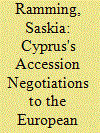

|
|
|
|
|
| Publication |
2008.
|
| Summary/Abstract |
The European Union did not push forcefully for an intercommunal settlement that would reunite Cyprus as a prerequisite for EU accession. As a result, it gave away the carrot without tying it to an important condition. Several explanations are drawn from an analysis of processual and structural factors in the negotiation context.
|
|
|
|
|
|
|
|
|
|
|
|
|
|
|
|
| 7 |
ID:
095278
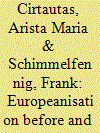

|
|
|
|
|
| Publication |
2010.
|
| Summary/Abstract |
This introductory essay reviews the literature on historical legacies in the post-communist area and relates it to the study of enlargement and Europeanisation. The authors develop a framework for the special section, specify various ways in which historical legacies can be conceived of affecting conditionality and compliance, give an overview of the contributions and summarise the findings.
|
|
|
|
|
|
|
|
|
|
|
|
|
|
|
|
| 8 |
ID:
101593


|
|
|
|
|
| Publication |
2010.
|
| Summary/Abstract |
The Global Political Agreement (GPA) signed between the two Movements for Democratic Change and the Zimbabwe African National Union-Patriotic Front (ZANU-PF) set the change for a new set of political dynamics in Zimbabwe. Although it has not transformed the coercive base of ZANU-PF's support, it has led to new battles for state power and changes in the strategies of the major political parties. The discussion below uses the great Italian Marxist Antonio Gramsci's conception of the 'passive revolution' to understand the changes in the political economy that have marked recent Zimbabwean politics, looking in particular at the different approaches of the three parties to the GPA during this period.
|
|
|
|
|
|
|
|
|
|
|
|
|
|
|
|
| 9 |
ID:
127075
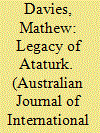

|
|
|
|
|
| Publication |
2013.
|
| Summary/Abstract |
There exists a significant and sustained difference between the ability of the European Union to successfully socialise those member states who have joined since the fall of Communism, and its apparent inability to similarly socialise Turkey. Despite some impressive legal and constitutional reforms since 2001, a key shortcoming remains, the unwillingness of many in the Turkish judiciary to implement those revised standards in a consistent way. Existing explanatory accounts of this inability would focus on the credibility of the Union offer of membership, the duration of negotiations or the importance of Turkish domestic standards. None of these, however, are able to account for why Turkey seems to occupy a half way position, exhibiting reformed laws but unreformed legal practice. To address this shortcoming this article shall combine existing scholarship on the importance of domestic normative contestation within Turkey with an appraisal of the shortcomings of the Union's conditionality policy itself that emerge from the conceptual studies of conditionality.
|
|
|
|
|
|
|
|
|
|
|
|
|
|
|
|
| 10 |
ID:
127073
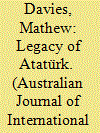

|
|
|
|
|
| Summary/Abstract |
There exists a significant and sustained difference between the ability of the European Union to successfully socialise those member states who have joined since the fall of Communism, and its apparent inability to similarly socialise Turkey. Despite some impressive legal and constitutional reforms since 2001, a key shortcoming remains, the unwillingness of many in the Turkish judiciary to implement those revised standards in a consistent way. Existing explanatory accounts of this inability would focus on the credibility of the Union offer of membership, the duration of negotiations or the importance of Turkish domestic standards. None of these, however, are able to account for why Turkey seems to occupy a half way position, exhibiting reformed laws but unreformed legal practice. To address this shortcoming this article shall combine existing scholarship on the importance of domestic normative contestation within Turkey with an appraisal of the shortcomings of the Union's conditionality policy itself that emerge from the conceptual studies of conditionality.
|
|
|
|
|
|
|
|
|
|
|
|
|
|
|
|
| 11 |
ID:
077887
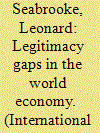

|
|
|
|
|
| Publication |
2007.
|
| Summary/Abstract |
Since the Asian financial crisis of 1997-1998, the International Monetary Fund (the Fund) has been embroiled in an international crisis of legitimacy. Assertions of a crisis are premised on the notions that the Fund's voting system is unfair, that the Fund enforces homogeneous policies onto borrowing member states and that loan programmes tend to fail. Seen this way, poor institutional and policy design has led to a loss of legitimacy. But institutionalised inequalities or policy failure is not in itself sufficient to constitute an international crisis of legitimacy. This article provides a conceptually-driven discussion of the sources of the Fund's international crisis of legitimacy by investigating how its formal 'foreground' institutional relations with its member states have become strained, and how informal 'background' political and economic relationships are expanding in a way that the Fund will find difficult to re-legitimate. The difference between the Fund's claims to legitimacy and how its member states, especially borrowers, act has led to the creation of a 'legitimacy gap' that is difficult to close. However, identifying the sources of the Fund's international crisis of legitimacy allows us to explore what avenues are available to resolve the crisis.
|
|
|
|
|
|
|
|
|
|
|
|
|
|
|
|
| 12 |
ID:
086302
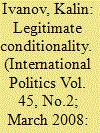

|
|
|
|
|
| Publication |
2008.
|
| Summary/Abstract |
This article analyzes European Union (EU) conditionality regarding the safety of Central and East European nuclear power reactors. Bulgaria, Lithuania, and Slovakia breached or evaded shutdown pledges made in exchange for foreign aid in the early 1990s. Conditionality proved more effective when the European Commission required reactor closure as a condition for accession. However, EU pressure gave rise to legitimacy concerns, as candidate country governments agreed to phase out reactors against the wishes of their citizens. The resultant problems exposed inherent discrepancies between conditionality and democracy. Such discrepancies cannot be resolved by the illusory concept of 'ownership'. Bridging two literatures, the article examines EU conditionality in the context of enlargement's 'democratic deficit'. Previously overlooked factors that discredit conditionality include stereotyping, symbolism, the reluctance to admit mistakes, and popular conspiracy theories about donor motives. Greater attentiveness to such factors can enhance conditionality's legitimacy.
|
|
|
|
|
|
|
|
|
|
|
|
|
|
|
|
| 13 |
ID:
148132
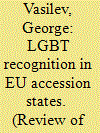

|
|
|
|
|
| Summary/Abstract |
In the EU accession literature, there is a tendency to downplay the role of discourse in facilitating norm diffusion, particularly when domestic resistance towards European norms is strong. The assumptions in this thinking are that critical deliberations and civil society activism simply lack the potency required to elicit norm conforming behaviour in accession states and that the only realistic hope for achieving this rests with the introduction of material incentives that make the costs of normative adaptation lower than its rewards. I focus on developments in the field of LGBT politics to challenge these assumptions and to specify the conditions under which discursive strategies are likely to stimulate the domestic uptake of contentious norms. I highlight shared identity as a crucial factor in the success of discursive influence, contending that under conditions of identity convergence, a cultural environment prevails in which norm promoters can more effectively ignite a process of deliberative reflection, shame norm-violators into conformance and cultivate resonance around controversial ideas. I develop these arguments through an analysis of LGBT and accession politics in Croatia and Serbia, contending that Croatia’s strong identification with Europe accelerated LGBT recognition there while Serbia’s relatively weaker identification with Europe slowed it down.
|
|
|
|
|
|
|
|
|
|
|
|
|
|
|
|
| 14 |
ID:
159779
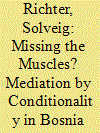

|
|
|
|
|
| Summary/Abstract |
In October 2009, the European Union, in conjunction with the United States, launched a high-level mediation effort in Butmir, Bosnia and Herzegovina, to reform the political structure of the state. Since 2005, the constitution which was included in the Dayton Peace Accord has been widely perceived as dysfunctional. In two negotiation rounds, the EU and the US put a comprehensive proposal on the table and showed strong leverage. However, the talks ended without a tangible result. To explain this failure, a theoretical model is developed based on both mediation and Europeanization literature to explore mediation by conditionality as a type of ‘directive mediation’ in a systematic way. Contrary to the argument that the EU lacked muscle, it is argued that pre-conditions for political conditionality were not fulfilled and strong leverage proved ineffective and counterproductive. These results question conditionality as an effective mediation strategy when state-building is contested between local parties.
|
|
|
|
|
|
|
|
|
|
|
|
|
|
|
|
| 15 |
ID:
099814


|
|
|
|
|
| Publication |
2010.
|
| Summary/Abstract |
This article presents a new analytical approach to the study of aid negotiations. Building on existing approaches but trying to overcome their limitations, it argues that factors outside of individual negotiations (or the `game' in game-theoretic approaches) significantly affect the preferences of actors, the negotiating strategies they fashion, and the success of those strategies. This approach was employed to examine and compare the experiences of eight countries: Botswana, Ethiopia, Ghana, Mali, Mozambique, Rwanda, Tanzania and Zambia. The article presents findings from these country studies which investigated the strategies these states have adopted in talks with aid donors, the sources of leverage they have been able to bring to bear in negotiations, and the differing degrees of control that they have been able to exercise over the policies agreed in negotiations and those implemented after agreements have been signed. It argues that Botswana, Ethiopia and Rwanda have been more successful than the other five cases in levering negotiating capital from the economic, political, ideological and institutional conditions under which negotiations occur.
|
|
|
|
|
|
|
|
|
|
|
|
|
|
|
|
| 16 |
ID:
095016
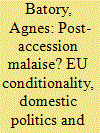

|
|
|
|
|
| Publication |
2010.
|
| Summary/Abstract |
Corruption in the then candidate countries of Central and Eastern Europe was a major concern for the European Union (EU) before its 2004 enlargement. This concern and its expression in the conditionality of membership constituted strong incentives for the candidate countries' governments to control corruption - or more precisely to take control measures that could be communicated to the European Union. A common assumption in the literature is that with the removal by accession of these incentives anti-corruption efforts would not be maintained at their pre-accession level. But is this really the case? Or have other influences from international organisations, domestic politics or civil society taken over to provide impetus for further corruption control interventions? This article considers these questions with respect to Hungary and finds that while some of the post-2004 measures have been a response to the country's international commitments, there have also been important domestic sources of reform. The results are, however, limited: despite the country's relatively smooth path to the European Union, membership of all the major international legal instruments and three major reform packages since 2000, corruption seems no less prevalent than it was a decade before.
|
|
|
|
|
|
|
|
|
|
|
|
|
|
|
|
| 17 |
ID:
089134
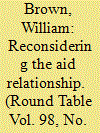

|
|
|
|
|
| Publication |
2009.
|
| Summary/Abstract |
Recent rhetoric surrounding the contemporary aid relationship between donors and African states is couched in terms of a high-level consensus between western and African political leaderships, a central pillar of which is adherence to liberal principles of governance and economic management. The paper argues that an analysis of the nature of this consensus and its prospects requires that we need to understand it as (1) encompassing specifically international-geopolitical dimensions (including state interests, bargaining and power); and (2) social-developmental purposes and content. The paper uses Rosenberg's considerations on 'international sociology' and uneven and combined development to provide a framework for analysing the aid relationship. In doing this, the paper speaks to two related theoretical issues: conceptualisations of the relationship between the 'social developmental' and the 'geopolitical/international' within International Relations (IR); and the contemporary relevance or otherwise of the discipline of IR to analyses of Africa's place in the international system
|
|
|
|
|
|
|
|
|
|
|
|
|
|
|
|
|
|
|
|
|